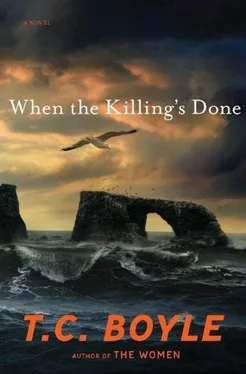She’d kept the radio off purposely because she wanted to be attuned to what was going on out there in the meadow, where since first light Anise had been sitting beneath a tarp propped up on the bifurcated ends of four bent eucalyptus sticks driven into the mud, with Bumper, the little black-and-white sheepdog, at her feet and her literature book spread open in her lap, and when the stew was going full boil, Rita was going to damp the stove, pull on another sweater and her rain slicker and go out there and join her. So the kitchen was quiet, the only sounds the hiss of the stove and the banked roar of the oven played against the murmur of Francisco’s dishrag, the intermittent tap of the rain and the distant watery bleating of the lambs.
The hands liked their food hot, as in spicy, a taste she’d come to acquire herself, especially if there was plenty of red wine for lubrication and bread or tortillas to sop it up with, and she cranked the handle of the pepper grinder over the pot for a good slow count of fifty before turning to the cutting board and the mound of roasted peppers. She split each of the serranos in two, swept them off the scarred plank and into the mouth of the pot, then shucked the skins from the roasted peppers, cut them in strips and added them to the mix. Then it was sage from the herb garden, paprika, parsley, a handful of bay leaves, and finally, five fennel bulbs — the stuff grew everywhere the sheep couldn’t get at it, as persistent as weeds — sliced and stirred into the simmering liquid to impart a faint hint of licorice at the very top of the palate. When she was done, she took the dented aluminum bowl full of scraps and cuttings and whatever had been left on the breakfast plates out into the rain-washed morning to toss it in the compost.
Strangely, it seemed warmer outside than in, the clouds rolling up out of the ridge to the south, bruised and fist-like, dense with tropical moisture. At her feet, new growth, shining with wet, the ground that had been barren so long exhaling low dense colorless clouds of vapor, as if it had been holding its breath till now. She felt the rain as cold pinpricks on her face, her scalp, the rigid plane of her extended right hand where it emerged from the turned-back sleeve of the wool sweater to clasp the rim of the bowl, and if the hand looked strange to her, like somebody else’s hand, rough, work-beaten, too little acquainted with the bridge of a guitar, then that was how it was and how it was going to be because she was a sheepwoman now and proud of it.
There was a time when she slept till two or three in the afternoon, when she stayed up all night jamming and carried her hands around as if they were wrapped in cellophane. Then their first album came out and everybody thought the world was going to open up to them like a foil-wrapped present under the Christmas tree, and then Anise was there and they made the second album before things crashed and burned and she and Toby and Anise came out to the West Coast, where it was happening, really happening, or so Toby claimed, but then it wasn’t happening and she’d had to start getting up early with all the rest of the wage slaves out there just to get to one shit job after another.
That was a long time ago and what she had then of ambition, of pushing out from herself to the world beyond, had settled deep inside her, gone inward, where it glowed like the last unquenchable ember in the stove. What did she love? Her people: Anise, Bax, Francisco. This place, where nature came at you in the raw, unmediated, untenanted, and you lived life in the moment. The flock. Bumper. And music. Music still. Music always. But when she played now it was for her daughter and her lover and the scored and weather-wrecked ranch hands, with their ruined teeth and wine-sweetened breath.
Behind her, the walls of the house were streaked with rain, dark veins of it pulsing against the pale skin of the stucco, the light from the kitchen window cutting a neat rectangle out of the wall below the smaller rectangle where Bax’s reading light glowed in the second-story window. He was up there under his blankets and the big down comforter and she was out here. In the rain. With a full day of watching and worrying ahead of her. Not that it mattered, she told herself, not so long as he got better. And, in a way, as terrible as it sounded, his misfortune was her boon delivered up on a platter, an opportunity to prove herself, to take charge of the lambing while the others were out in the hills, mending fences and keeping the roads open with an eye to the roundup at the end of February, when the lambs would be docked and castrated along with any of the strays they’d missed the previous year. No need for them to hang around here when there was so much to be done up above. And really, there wasn’t much to the lambing — the ewes did all the work. You just needed to keep watch during those first critical hours against some disturbance of the flock, a jolt of panic that would set them running and leave the newborns alone even for the space of a minute, because that was all it took for the ravens to come on.
This year she and Anise had posted Keep Out signs on the beach at Scorpion and at Smugglers’ Cove over the ridge to the southeast, closing off the ranch to all visitors while the lambing was under way so there’d be no chance of any interference, intentional or not — unlike last year, when two jerks in a speedboat had buzzed the cove, taking potshots at anything that moved, the crack of their rifles repeating up the canyon in rolling crescendo till the flock scattered every which way. That had been a disaster. They must have lost fifty newborn lambs in the space of an hour, fifty lambs that wouldn’t grow and thrive and be sent to market, and that took a real bite out of their profits. For weeks after, all she could think of was revenge, of standing those grinning idiots up against the wall of the house and shooting them with their own guns, see how they liked it. That was her fantasy, like something out of a John Ford movie, but even in her rage, even at her hardest, she knew it was just that. The only gun she’d ever touched in her life was the.22 Bax kept behind the front door to discourage ravens and the big golden eagles that carried the lambs off to their nests and dropped the empty sacks of hide to the ground when they were done, and she’d never fired it, wasn’t even sure if she could figure out how.
She paused a moment to lift her face to the sky. The clouds were dark and tight-knit, the rain dancing off her skin: there wouldn’t be any day-trippers coming out from the coast, not with this weather. She upended the bowl of scraps on the mulch pile, then took a minute to turn it with the pitchfork because it needed to be turned and she meant to deny the ravens these scraps too. It was then, the rain sizzling down and the working heat at the center of the pile giving up a plume of condensation and a curdled dank reek of decay, that she detected movement out of the corner of her eye and looked round to see the fox there in the lee of the Jeep, one paw suspended in mid-step.
Now here was an animal she could get behind — too small to annoy the sheep and always on the prowl for the mice that plagued the main house, their droppings ubiquitous, scattered over everything in dark little gift packets of filth and disease. She made a kissing noise and watched the fox’s ears come erect. Then, very slowly, she bent to the pile to unearth the fresh scraps till she found a wet red fragment of bone and gristle and tossed it to him. It landed with a soft thump in the wet earth at his feet and he took it gingerly, as a dog would, but without fear or concern — people were no threat to him. He’d been here longer than they had and he went on eating his mice, insects, the occasional bird, and if people left food around (or variously, Francisco’s briar pipe that went missing from the porch one evening, a half-burned candle, sweated socks hung out on the rail to dry and concentrate the salts of the body), he would oblige them by expanding the range of his diet. She watched him worrying the bone a moment, pinning it with his paws and working it with his teeth, his fur slicked with the rain and his eyes casting her adrift as if she had no significance at all, and then she went back in the house to see to the stew and slide the loaves into the oven.
Читать дальше












